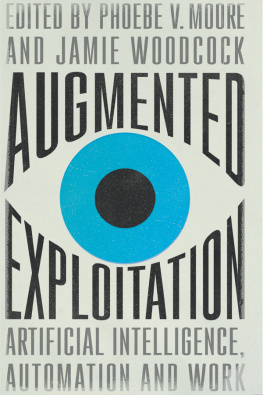Phoebe Moore - Augmented Exploitation
Here you can read online Phoebe Moore - Augmented Exploitation full text of the book (entire story) in english for free. Download pdf and epub, get meaning, cover and reviews about this ebook. publisher: Book Network Intl Limited trading as NBN International (NBNi), genre: Politics. Description of the work, (preface) as well as reviews are available. Best literature library LitArk.com created for fans of good reading and offers a wide selection of genres:
Romance novel
Science fiction
Adventure
Detective
Science
History
Home and family
Prose
Art
Politics
Computer
Non-fiction
Religion
Business
Children
Humor
Choose a favorite category and find really read worthwhile books. Enjoy immersion in the world of imagination, feel the emotions of the characters or learn something new for yourself, make an fascinating discovery.
- Book:Augmented Exploitation
- Author:
- Publisher:Book Network Intl Limited trading as NBN International (NBNi)
- Genre:
- Rating:3 / 5
- Favourites:Add to favourites
- Your mark:
- 60
- 1
- 2
- 3
- 4
- 5
Augmented Exploitation: summary, description and annotation
We offer to read an annotation, description, summary or preface (depends on what the author of the book "Augmented Exploitation" wrote himself). If you haven't found the necessary information about the book — write in the comments, we will try to find it.
Augmented Exploitation — read online for free the complete book (whole text) full work
Below is the text of the book, divided by pages. System saving the place of the last page read, allows you to conveniently read the book "Augmented Exploitation" online for free, without having to search again every time where you left off. Put a bookmark, and you can go to the page where you finished reading at any time.
Font size:
Interval:
Bookmark:

Augmented Exploitation
Wildcat: Workers Movements and Global Capitalism
Series Editors:
Immanuel Ness (City University of New York)
Peter Cole (Western Illinois University)
Raquel Varela (Instituto de Histria Contempornea [IHC] of Universidade Nova de Lisboa, Lisbon New University)
Tim Pringle (SOAS, University of London)
Also available:
The Cost of Free Shipping:
Amazon in the Global Economy
Edited by Jake Alimahomed-Wilson and Ellen Reese
Choke Points:
Logistics Workers Disrupting the Global Supply Chain
Edited by Jake Alimahomed-Wilson and Immanuel Ness
Dying for an iPhone:
Apple, Foxconn and the Lives of Chinas Workers
Jenny Chan, Mark Selden and Pun Ngai
Just Work?
Migrant Workers Struggles Today
Edited by Aziz Choudry and Mondli Hlatshwayo
Wobblies of the World:
A Global History of the IWW
Edited by Peter Cole, David Struthers and Kenyon Zimmer
Organizing Insurgency:
Workers Movements in the Global South
Immanuel Ness
Southern Insurgency:
The Coming of the Global Working Class
Immanuel Ness
Amakomiti:
Grassroots Democracy in South African Shack Settlements
Trevor Ngwane
Workers Inquiry and Global Class Struggle: Strategies, Tactics, Objectives
Edited by Robert Ovetz
The Spirit of Marikana:
The Rise of Insurgent Trade Unionism in South Africa
Luke Sinwell with Siphiwe Mbatha
Solidarity:
Latin America and the US Left in the Era of Human Rights
Steve Striffler
Working the Phones:
Control and Resistance in Call Centres
Jamie Woodcock
Artificial Intelligence, Automation and Work
Edited by Phoebe V. Moore
and Jamie Woodcock

First published 2021 by Pluto Press
345 Archway Road, London N6 5AA
www.plutobooks.com
Copyright Phoebe V. Moore and Jamie Woodcock 2021
The right of the individual contributors to be identified as the authors of this work has been asserted in accordance with the Copyright Designs and Patents Act 1988
British Library Cataloguing in Publication Data
A catalogue record for this book is available from the British Library
ISBN 978 0 7453 4350 1 Hardback
ISBN 978 0 7453 4349 5 Paperback
ISBN 978 0 7453 4353 2 PDF eBook
ISBN 978 0 7453 4352 5 Kindle eBook
ISBN 978 0 7453 4351 8 EPUB eBook
This book is printed on paper suitable for recycling and made from fully managed and sustained forest sources. Logging, pulping and manufacturing processes are expected to conform to the environmental standards of the country of origin.
Typeset by Stanford DTP Services, Northampton, England
Simultaneously printed in the United Kingdom and United States of America
Workers movements are a common and recurring feature in contemporary capitalism. The same militancy that inspired the mass labour movements of the twentieth century continues to define worker struggles that proliferate throughout the world today.
For more than a century, labour unions have mobilised to represent the political-economic interests of workers by uncovering the abuses of capitalism, establishing wage standards, improving oppressive working conditions, and bargaining with employers and the state. Since the 1970s, organised labour has declined in size and influence as the global power and influence of capital has expanded dramatically. The world over, existing unions are in a condition of fracture and turbulence in response to neoliberalism, financialisation, and the reappearance of rapacious forms of imperialism. New and modernised unions are adapting to conditions and creating a class-conscious workers movement rooted in militancy and solidarity. Ironically, while the power of organised labour contracts, working-class militancy and resistance persists and is growing in the Global South.
Wildcat publishes ambitious and innovative works on the history and political economy of workers movements and is a forum for debate on pivotal movements and labour struggles. The series applies a broad definition of the labour movement to include workers in and out of unions, and seeks works that examine proletarianisation and class formation; mass production; gender, affective and reproductive labour; imperialism and workers; syndicalism and independent unions, and labour and Leftist social and political movements.
Jamie Woodcock and Phoebe V. Moore would like to thank the organisers of the International Labour Process Conference (ILPC) 2019 in Vienna for accepting our stream on artificial intelligence and work. The contributors to this book presented in the stream, and we would like to acknowledge all of their efforts and contributions. A big thanks to David Shulman at Pluto for supporting the book idea, as well as to Robert Webb for guiding it through production. Each of the authors of the book were a pleasure to work with, particularly through the challenges of collecting final versions and changes through the Covid-19 pandemic.
When writing about work it is important to remember that there are already many people who keenly feel the effects of new technology in both recognised and unseen work. We therefore dedicate this book to all those workers finding new ways to make, fake, or break technology at work.
Phoebe V. Moore: I would like to acknowledge my mother Aureol for her steadfast support, and my father, Tom, for the same, over many years from PhD until now. My four brothers likewise, are continuously in my thoughts. I would also like to acknowledge Jamie Woodcock for being a very good co-organiser and co-editor.
Jamie Woodcock: I would like to thank my partner Lydia for her support throughout this project. I would also like to thank Phoebe V. Moore, both for coming up with the idea of an edited collection and for being a great collaborator and editor to work with.
Technology has shaped and reshaped work in various ways throughout history. Digital technology is continuing to create widespread change across different kinds of work, a process that is set to intensify with the increasing use of artificial intelligence (AI) and automation. So far, there has been documented use of AI in the hiring, managing and firing of workers. Less understood are the effects of this on the labour process, workers and managers more broadly. Although platform work uses AI extensively to plan, manage and control workers, there is limited empirical research on how these processes operate in practice.
There are two main problems with how AI and automation are discussed today. The first is a sense that they are somehow new and unprecedented interventions into the labour process. Historically, the machine is an attempt to automate part of the labour process, increasing the amount produced by a worker. It has a significantly longer history than self-driving cars or automated warehouse pickers. This leads us to the second problem: there is often a binary understanding of automation, either something will be automated or not. This leads to a focus on the machine how effective is the new self-driving vehicle, for example rather than looking at how automation is actually affecting work and workers. Rather than an either/ or, automation is used much more as an
Font size:
Interval:
Bookmark:
Similar books «Augmented Exploitation»
Look at similar books to Augmented Exploitation. We have selected literature similar in name and meaning in the hope of providing readers with more options to find new, interesting, not yet read works.
Discussion, reviews of the book Augmented Exploitation and just readers' own opinions. Leave your comments, write what you think about the work, its meaning or the main characters. Specify what exactly you liked and what you didn't like, and why you think so.












